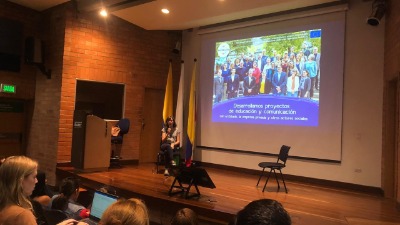In Medellín school curricula are focused on academic content compartmentalized by traditional knowledge disciplines with little connection to the context of students, who perceive education as a sphere disconnected from their reality.
The Medellin LEC led by EAFIT Children's University, seeks to encourage students to engage with science as a useful tool to the solution of local problems through active learning experiences (called teaching units) collaboratively designed by academia, the private sector, non-profit organizations and the public sector addressing, as a pedagogical strategy, 8 city-relevant issues (health, environment, economic development, culture, mobility, gender equity, youth and social inclusion).
The Medellin LEC led by EAFIT Children's University, seeks to encourage students to engage with science as a useful tool to the solution of local problems through active learning experiences (called teaching units) collaboratively designed by academia, the private sector, non-profit organizations and the public sector addressing, as a pedagogical strategy, 8 city-relevant issues (health, environment, economic development, culture, mobility, gender equity, youth and social inclusion).
The LEC Medellín is a methodology of cross-sectoral co-design focused on school, in this process are involved organizations (privates and non-profit) experts in specific topics, ninth-grade school teachers and decision makers. The challenge of this co-design team is to create teaching units that encourage ninth-grade students to engage with science as a tool to contribute to the solution of local problems. Then, this process involved ninth-grade school teachers in a training program on active learning. Thus, the LEC encourages and supports organizations in various sectors to recognize and explore their potential contribution to a more relevant education.
LEC Medellin will focus on contributing to educational quality by connecting curricula to local context issues involving STEAM through an open schooling strategy.
To achieve this mission is necessary to connect curricula with local context by a cross-sectoral collaboration and developing a Local Education Cluster - LEC -; enrich teacher’s teaching experiences based on collaboration designing process.
It is expected that the local context will benefit by developing a Local Education Cluster - LEC - and bringing together different actors and institutions with experience in formal and non -formal education. In fact, this purpose is also part of the OECD recommendations for improving the Colombian educational system.
To achieve this mission is necessary to connect curricula with local context by a cross-sectoral collaboration and developing a Local Education Cluster - LEC -; enrich teacher’s teaching experiences based on collaboration designing process.
It is expected that the local context will benefit by developing a Local Education Cluster - LEC - and bringing together different actors and institutions with experience in formal and non -formal education. In fact, this purpose is also part of the OECD recommendations for improving the Colombian educational system.
Encourage ninth - grade students to engage with science as a tool to contribute to the solution of local problems through learning experiences designed between academia, Industry, non-profit organizations and the state.
Ana Maria Londoño Rivera, EAFIT University
Carolina Arango Hurtado, EAFIT University
Selene Isabel Pineda Gomez, EAFIT University
Andrea Zuleta, EAFIT University
Carolina Arango Hurtado, EAFIT University
Selene Isabel Pineda Gomez, EAFIT University
Andrea Zuleta, EAFIT University
Fundación Ratón de Biblioteca, NGO
Corporación Cultural Nuestra Gente, NGO
Corporación Otraparte, NGO
Corporación para la Vida Mujeres que Crean, NGO
Low Carbon City, NGO
UNHCR/ACNUR, NGO
Proantioquia, NGO
El Colombiano “Prensa Escuela”, Company
ISA Intercolombia, Company
METRO de Medellín, Company
Parque de la Conservación, Company
Fundación SURA, Company
Profamilia, Company
Medellin Social Inclusion Office
Medellin Education Office
Ciudad Don Bosco, School
Colegio Marymount, School
Unidad Educativa San Marcos, School
Corporación para la Educación Integral y el Bienestar Ambiental La CEIBA, School
CEFA (Centro Formativo de Antioquia), School
CTA (Centro de ciencia y tecnología de Antioquia), NGO
Antioquia Governor’s Office
Comunidad Colegio Jesús Maria, School
Colegio San José de las Vegas, School
Colegio Hontanares, School
I.E. Santa Teresa, School
Corporación Cultural Nuestra Gente, NGO
Corporación Otraparte, NGO
Corporación para la Vida Mujeres que Crean, NGO
Low Carbon City, NGO
UNHCR/ACNUR, NGO
Proantioquia, NGO
El Colombiano “Prensa Escuela”, Company
ISA Intercolombia, Company
METRO de Medellín, Company
Parque de la Conservación, Company
Fundación SURA, Company
Profamilia, Company
Medellin Social Inclusion Office
Medellin Education Office
Ciudad Don Bosco, School
Colegio Marymount, School
Unidad Educativa San Marcos, School
Corporación para la Educación Integral y el Bienestar Ambiental La CEIBA, School
CEFA (Centro Formativo de Antioquia), School
CTA (Centro de ciencia y tecnología de Antioquia), NGO
Antioquia Governor’s Office
Comunidad Colegio Jesús Maria, School
Colegio San José de las Vegas, School
Colegio Hontanares, School
I.E. Santa Teresa, School
n/a

